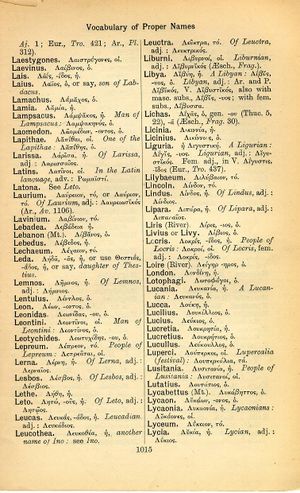Lycaon
ἀλλήλων τὰ βάρη βαστάζετε, καὶ οὕτως ἀναπληρώσετε τὸν νόμον τοῦ Χριστοῦ → bear each other's burdens, and in that way fulfill the anointed King's Law (Galatians 6:2)
English > Greek (Woodhouse)
Λυκάων, -ονος, ὁ.
Latin > English (Lewis & Short)
Lycāon: ŏnis, m., = Λυκάων,
I a king of Arcadia, father of Callisto, whom Jupiter, because he had defiled his altar with human sacrifices, turned into a wolf; acc. to Ovid, because he had tried to murder Jupiter himself, who was his guest, Ov. M. 1, 198; Hyg. Fab. 176 sq.; Cic. Fam. 3, 10, 10; acc. Lycaona, id. ib. 2, 526.—
B His grandson, also called Arcas, Ov. F. 6, 225.—Hence,
II
A Lycāŏnĭus, a, um, adj., of or belonging to Lycaon, Lycaonian: mensa, Ov. Ib. 433: parens, i. e. Callisto, id. M. 2, 496; cf. Cat. 66, 66: Arctos, i. e. Callisto as the constellation of the Bear, Ov. F. 3, 793; 6, 235. —Hence, axis, the northern sky, where the constellation of the Bear is situated, Ov. Tr. 3, 2, 2.—
B Lycāŏnis, ĭdis, f., the daughter of Lycaon, i. e. Callisto, Ov. F. 2, 173.
Latin > French (Gaffiot 2016)
(2) Lўcāōn, ŏnis, m. (Λυκάων), roi d’Arcadie, changé en loup par Jupiter : Hyg. Fab. 176 ; Cic. Fam. 3, 10, 10 ; Ov. M. 1, 198 || petit-fils du précédent, père de Callisto, aussi nommé Arcas : Ov. F. 6, 225 || -ŏnĭus, a, um, de Lycaon : Catul. 66, 66.

